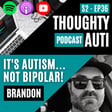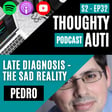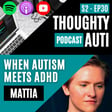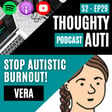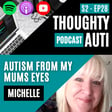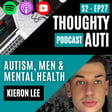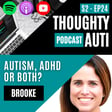
Autism Misdiagnosis Horror Story! - Life In A Psychiatric Hospital w/LottsVoicingAutism
What is it like inside a psychiatric hospital!? How bad can misdiagnosis go? What are some flaws in way we deal with mental health?
In this episode, Thomas talks to Lottie (@lottsvoicingautism) about her experience with being a misdiagnosed autistic. She was sent to a psychiatric hospital with multiple psychotic and mood disorders, living life under lockdown even before COVID-19... Within the topic, we chat about the reasons why she was admitted to hospital, the grounds to which she was misdiagnosed, the various cocktail of medications she was put on, and the traumatic experiences she had within
We talk about the positive things she's done with her almost unreal experiences in hospital, highlighting just how difficult and unfriendly hospitals can be for individuals on the autistic spectrum.
This horrific story is a testament to Lottie's strength and resilience, but also highlights just how little doctors know about autism in females... are we still at the primitive stage where autistic meltdowns are confused for psychotic episodes? You can be the judge of that.
If you have an exciting or interesting story and want to appear on the next podcast, please contact me at: aspergersgrowth@gmail.com
Lottie's Links:-
► Instagram - https://www.instagram.com/lottsvoicingautism/
► Photography Page - https://www.instagram.com/lottiebphotography/
► Lottie's Film - https://www.youtube.com/watch?v=ZaGN6Yelo7Q
▬▬▬▬▬▬▬▬▬▬▬▬▬▬▬▬▬▬▬▬▬▬▬▬▬▬▬▬▬▬▬
Channel Merchandise - https://teespring.com/stores/aspergers-growth
Support via Patreon! - https://www.patreon.com/aspergersgrowth
Social Media ♥ -
☼ Facebook - Aspergers Growth
☼ Twitter/Instagram - @aspergersgrowth
♫ Listen On -
Spotify - https://open.spotify.com/show/6vjXgCB7Q3FwtQ2YqPjnEV
Apple Podcasts - https://podcasts.apple.com/gb/podcast/thoughty-auti-the-autism-mental-health-podcast/id1470689079
Music -
♫ Track: [Chill Music] Ikson - Reverie [No Copyright Music]
Advert Track: Empty Parking Lot - Colours Of Illusion [Epidemic Sound]







